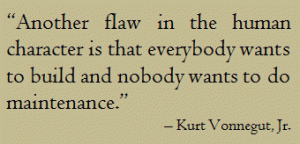Fragility, thy name is living
When something important in life goes wrong, it colors our reaction to later experiences.
For example, back in the late 90s I owned a bunch of stock options that had been granted by my employer. To the surprise of almost everybody (certainly to my surprise), one day the price of that stock began a very steep and seemingly endless climb into the stratosphere. Before long that trend had made me a millionaire (on paper). This was something new! It felt good. And since the trend showed no sign of stopping, nobody who owned that stock wanted to sell. But then the bottom fell out. By the time I understood that this wasn’t just a temporary dip, it was too late. Believe me, that felt bad.
Therefore, a few years later when home prices in my city began emulating that stock, I resolved not to make the same mistake twice. We sold our house, and as it turns out its market value did head south afterwards. Smart move? Maybe. The two situations weren’t entirely comparable, because we still had to live somewhere. But selling was an effort to stay in control—to be a participant at least in unfolding events, to hold onto value even at the cost of giving up something else.
I’m telling that story simply to illustrate the effect past disappointment can have on future decision making: Once bitten, twice shy. Pain avoidance motivates the most basic kind of learning.
And there is pain, and loss, to be experienced in this life. We don’t like to think about it, but each of us is vulnerable to drastic upheavals. They come via tornadoes in Oklahoma, horrific acts perpetrated in Boston and now in London, and a multitude of less newsworthy events taking place daily.
Bad stuff goes down. And here’s the idea I’m struggling to express: In view of the fragility of peace and comfort, maybe it’s time to revisit our priorities. Even given the fact that in trying to control the outcome, we may have imperfect results (as in my decision to sell the house), I think we ought to try first of all to hold on to the good in what we now have—as opposed to taking that for granted and grasping for something else.
Another personal story may illustrate this. The discovery that one’s baby has profound developmental problems is comparable, I think, to losing one’s home to a tornado. I can’t say for sure, having experienced only the former, but that discovery changed everything for my family. My memoir is the story of our uphill struggle to make things right again. Typically, anything lost (health, trust, etc.) is very difficult to restore. Even a partial restoration (in our case, simply lessening the disabilities of our child) is no sure thing. Now, we couldn’t foresee or prevent whatever it was that originally hurt Joseph, but his mom and I had a say in what we were willing to do about it. And the campaign we launched on his behalf led, for a time, into some of the most intense and stimulating and even exhilarating living I have ever known. We were more than glad to do it. But as he progressed along the pathway toward a condition that we viewed as his birthright (wellness), the going became more difficult, for him and for us, and the impact on our financial and personal health became harder to ignore. There came a point beyond which it made no sense to sacrifice the assets we had in pursuit of something we might never achieve.
There may be differences of opinion as to just where that point was—but we crossed it. At speed.
Even so, despite knowing that we crossed it, I remain susceptible to temptations that could put the family on the same course once again. I have to be careful.
Are there no such issues in your life? Maybe not, but I’m writing this as a suggestion for each and all of us to recognize the value in what we already have. Sometimes, having anything good at all seems almost miraculous. I hope this doesn’t sound like a platitude. The mindfulness I’m thinking about involves renewed commitment every day to maintain blessings that we as individuals will most certainly miss if we no longer have them. Examples of this maintenance might include:
Getting exercise and enough sleep, avoiding excessive stress, eating properly, etc.
Using seatbelts and generally avoiding needless risks
Following a budget, getting out of debt, reviewing financial goals
Participating in and contributing to the community
By the way, I’m talking to myself here as much as to anyone else. I have violated such rules often. But in looking around and absorbing the news, I suspect this is a message for others as well, in particular:
Anyone impressed by a politician who vowed to “fundamentally transform” a pretty good system
Anyone who blames his own culture or any part thereof for atrocities committed by crazed representatives of another culture
Maybe this sensitivity goes back to my discovery that bubbles can pop. That doesn’t mean it’s misplaced. I’m very much afraid that, in straining for something that’s out of reach, we as a society are throwing away something much nearer that will be exceedingly hard to recover.
This fear is not for myself. I’ve already had my chance to enjoy a free and reasonably prosperous life. It comes back to the kids, mine and yours, who must start with whatever we leave behind.




